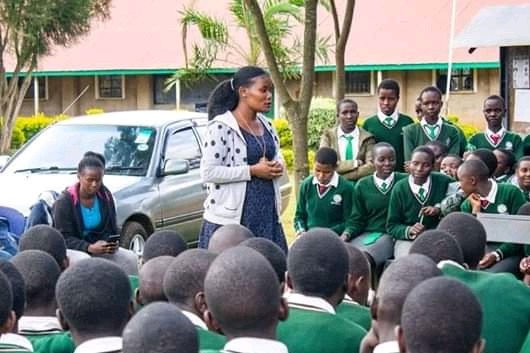Championing girls’ rights – from Moi University, Kenya to Brussels.
“Congratulations Mercy Kioko, you have been selected to pursue a degree in Community Health Education, Nursing Administration and Research in Moi University – College of Health Sciences”.
These were the words that got me fired up one Friday evening as I read the letter of invitation to attend one of the most prestigious universities in Kenya. I began imagining how I would walk and live in a place that nurtured Olympic champions like Kipchoge Keino and Vivian Cheruiyot, whose achievements made Kenya’s flag proudly sway high. I could hardly wait to become a champion in my own way – even if through studies, for I was sure as sunrise that I could never participate in the Olympic games!
During the first year of my studies, a good friend introduced me to an international organisation – Deutsche Stiftung Weltbevoelkerung – which supports young people to gain access to quality reproductive health services and information. With a passion for helping communities, I saw this as a great opportunity to start making an impact even before I finished school. Gradually, the silent issues that face the region of Moi University began to unfold. According to Kenya’s 2009 census, the population of Uasin Gishu County was at 893,611 people and is projected to increase to 1,346,882 by 2030. The contraceptive prevalence rate is 56.2% – lower than the national contraceptive prevalence rate of 58.2% and young people (10-24) constitute about 40% of the total population in the county.


Youth, especially girls my age or even younger, face a number of reproductive health challenges. These include unsafe abortion, early marriage, menstrual hygiene challenges, new HIV infections and adolescent pregnancies. According to data by the National Council of Population Development, Uasin Gishu County has one of the eleventh highest teenage pregnancy rates in Kenya. There are many reasons for this statistic – poverty, lack of youth friendly centers or failure to integrate youth friendly services in major hospitals, lack of information, culture and others. These statistics got me wondering how was the county that has brought forward so many champions not a champion of sexual and reproductive health and rights?
That’s why I felt I had to step up as a DSW youth advocate, and champion better reproductive health care for young people. Together with my fellow champions, we advocate for the inclusion of a family planning budget line in the county health budget. We do this by engaging the leaders in the ministry of health and county assembly committees, especially the Health committee, Budget & Appropriations and Finance and Economic Planning committee. We actively participate in the health budget processes – submitting memos, pointing out areas that need prioritisation in planning and resource allocation. We also conduct outreach sessions on sexual and reproductive health rights and run online discussions to increase awareness on modern contraceptives and busting myths and misconceptions associated with family planning.
“Dear Mercy – you have been chosen to represent DSW Kenya youth advocates in Brussels in October 2019”. Another set of words that got me fired up. I’m really looking forward to joining DSW youth advocates from across East Africa in Brussels for the European Week of Action for Girls. I will be speaking out on the issues facing girls in my county and across Kenya, and discussing how the European Union can stand up for the rights of girls around the world, and fight for our right to freely make decisions about our health, our bodies, and our futures. I will be a champion of girls’ rights.
You can find out more about the European Week of Action for Girls here.
